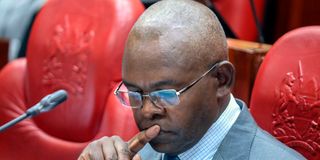
Central Bank Governor Kamau Thugge before the Senate Committee on Finance and Budget on December 4, 2023.
Central Bank of Kenya (CBK) Governor Kamau Thugge is expected before a Parliamentary committee today (Tuesday) to explain why loans offered by local commercial banks are still expensive despite CBK lowering its benchmark interest rate to make credit cheaper and affordable.
The Finance and National Planning Committee of the National Assembly, chaired by Molo MP Kimani Kuria, will also interrogate Dr Thugge and Capital Market Authority (CMA) CEO Wycliffe Shamiah over the National Social Security Fund’s (NSSF) involvement in questionable bond transactions.
This came after it emerged that NSSF bought bonds at a significantly higher price but sold the same bonds at a lower price, an impropriety that may have seen public funds lost.
“The committee will be seeking to know the interventions made by the CBK to ensure that credit from the local commercial banks is cheaper having lowered the CBR rate,” said Mr Kuria.
CBK’s Monetary Policy Committee (MPC) lowered the CBR to 10.75 percent from 11.25 percent at its February 5, 2025 meeting to boost private sector credit growth as well as deal with economic slowdown.
This followed a series of rate cuts including a 75 basis point reduction in December 2024.
The MPC noted a slowdown in economic growth in the first half of the year and deemed further easing necessary to stimulate activity while preserving exchange rate stability.
Claims of improper dealing in bonds by the NSSF involving two CSD accounts of NSSF – those of an individual and a local commercial bank – came up last year having been flagged by the CBK. However, the committee could not interrogate the matter as CBK and CMA bosses requested more time to prepare.
CBK is a state agency established by an Act of Parliament and is charged with, among others, regulating the banking industry in the country.
The parliamentary investigations into the matter come after CBK detected and alerted CMA of the questionable bond dealings by the NSSF.
At the centre of CBK’s August 19, 2024 letter to Mr Shamiah for action, is the questionable bond transaction through the NSSF CSD accounts and those of Mr Humphrey Wachira Gichuru and Pergamon Investment Bank Ltd.
“The Central Bank of Kenya would like to bring to your attention some irregular trades carried out between May to July 2024 between NSSF Kenya, Humphrey Wachira, and Pergamon Investment Bank Limited,” reads the letter signed by Mr David Luusa, CBK’s Director of Financial Markets Department.
According to the letter, the NSSF’s CSD accounts involved in the trade are 114813-0004 and 142816-0004 with Mr Wachira’s CSD accounts 234783-0004 and 265560-0004 and Pergamon bank’s CSD accounts 245351-0004, 207255-0004 and 245221-0004.
“The purpose of this letter is to request the CMA to review the conduct of the above-mentioned parties and share the actions taken with the Central Bank of Kenya,” said Mr Luusa.
According to Mr Luusa, CBK’s analysis of the trades between the parties indicates that NSSF Kenya was buying bonds at significantly higher prices than the market average “while in some cases, NSSF Kenya sold some bonds at lower prices and bought the same bonds at higher prices in a few days”.
Mr Shamiah was required to contact CBK’s Deputy Director in charge of Debt Management for specific transaction details relating to the NSSF’s bonds trades but he was not available to explain the steps taken to address the concerns raised by CBK.
Through its Financial Reporting Centre (FRC), CBK is able to flag and report suspicious dealings in the banking industry.
In the performance of its mandate, CBK formulates and implements monetary policy that promotes price stability, fosters liquidity, solvency, and stability of the banking sector, issues currency notes and coins, and provides banking services to the government, commercial banks, and other financial institutions.
CMA, established in 1989 as a statutory agency under the Capital Markets Act, is responsible for regulating and developing orderly, fair, and efficient capital markets in the country with the view of promoting market integrity and investor confidence.
The Finance Committee chairman noted that at a time when the country is faced with revenue constraints to finance its budgetary obligations “we cannot afford to sit back and allow people to abuse the limited public resources through some questionable dealings for selfish gain”.











